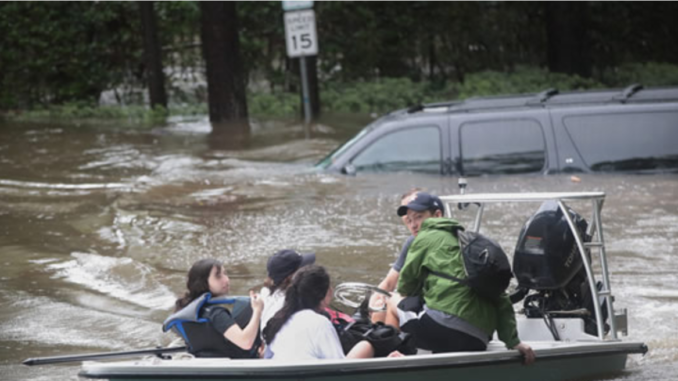
TRAGIC incidents such as the recent Hurricane Harvey that swept through the Southern parts of the United States have once again brought home the fact of the inevitability of natural disasters and the need to adequately empower emergency services for an adequate and effective response whenever they occur. With a recent rash of disasters of diverse magnitude recorded across the world, it would be naïve of anyone to believe that there are some areas that are immune to the rage of nature.
In particular, Nigerians have always had the belief that natural disasters such as earthquakes, tsunamis, tornadoes and mudslides are alien to their country; such things come to many of them as news items on television or as newspaper headlines. But recent happenings, like the current flooding in Benue State or that of 2012 that reportedly claimed 431 Nigerian lives and the recent cases of earthquake reported in Kaduna State are emphatic evidence of lurking natural disasters waiting to happen.
Figures from the National Emergency Management Agency indicate that about 1.3 million people were displaced in that flooding, which also led to the submergence of hundreds of acres of farmland across 30 states of the federation. Perhaps, with better management and coordination of resources, more lives could have been saved and the monumental devastation reduced.
Besides, the recent mudslide that happened in Freetown, the Sierra Leonean capital, which resulted in 499 deaths, with 600 other lives unaccounted for, according to BBC reports, offers sufficient reasons to believe that such things are getting closer home. As the world was mourning the dead in Freetown, an earthquake of magnitude 6.8 on the Richter scale was reported 880 kilometres off the shores of Liberia. If these things could happen in Sierra Leone and Liberia in the West African coast, what is the guarantee that they cannot occur in Nigeria?
It is only fitting that authorities should be working on efforts to mitigate the impact of earthquakes, for instance, following a series of tremors recorded, especially, in the South-West states over the years. In the Kaduna State incidents in September last year, the two tremors – within a space of 24 hours – gave the lie to the widely-held, but largely uninformed, view that Nigeria is situated on “stable Pre-Cambrain-Paleozoic age basement terrain believed to be seismically safe.”
While it is not possible to stop natural disasters, it can be better managed to reduce the tragic consequences. Despite lessons learnt from the devastation of New Orleans after Hurricane Katrina of 2005, and the enormous resources at the disposal of emergency services in that country, it still did not prevent last week’s Category 4 storm, Hurricane Harvey, from unleashing unprecedented havoc on Texas and Louisiana.
Described as catastrophic by the National Weather Service, the flooding witnessed in Houston as a result of intense rainfall was unprecedented. “The breadth and intensity of this rainfall are beyond anything experienced before,” the weather service tweeted. It was however possible to reduce the number of casualties considerably. While about 2,000 lives were lost to Hurricane Katrina in 2005, reports so far indicate that between 50 and 60 people died during Hurricane Harvey.
Yet, in terms of severity, both hurricanes measured as category 4 in the Saffir-Simpson hurricane wind scale when they made downfall. This placed them next to a category 5 hurricane, which is the worst and most destructive, based on the wind speed. But Harvey is still considered to have had an edge over Katrina in the magnitude of devastation, save, as mentioned earlier, for the number of casualties. The Texas governor, Greg Abbot, told Fox News that while Katrina caused $120 billion damage, Harvey “will cost $120 billion, probably $150 billion to $180 billion.”
What was indeed notable about the incident was the response of volunteers and the emergency services. The US Federal Emergency Management Agency was quoted as saying that it was providing more than one million meals, more than a million litres of water, 20,000 tarpaulins, and 70 generators. The agency also said it was deploying 30 aircraft, 1,800 staff and 500 high water vehicles to cope with the situation, while the US Army engineers were on hand to help with the restoration of power.
Special attention was paid to the weak, children and the elderly. Even pets like dogs and cats were not overlooked by the volunteers. People formed a chain to prevent others from being swept away by the flood. People came up with boats which they used to ferry those worst hit and facing the greatest threats. These are critical lessons that could be imbibed in Nigeria. Water channels should also be cleared to allow free flow of water into rivers and oceans.
Unfortunately, what is usually noticeable in such tragic situations in Nigeria is people trying to profit from the misfortunes of their compatriots. A good example is what is currently going on in the Internally Displaced People’s camps in the North-East of the country. While many people are dying as a result of shortage of foodstuffs, medicines, water, among other essentials, the Nigeria officials are busy trying to divert those materials for sale in the open market.
This has always resulted in food shortage, sometimes leading to the kind of protest that took place on August 29 at an IDP camp in Maiduguri, Borno State, where volunteers were attacked by the IDPs. Money is important in emergency response but it should not be everything. The main issue should be organisation, which should be offered by NEMA, while other groups, including the Red Cross, could just key in.
With the effect of climate change rapidly manifesting, experts believe that disasters, such as have never been witnessed before, will become more frequent. Nigeria should be ready so that when they happen, the country will not be caught napping.
END

Be the first to comment